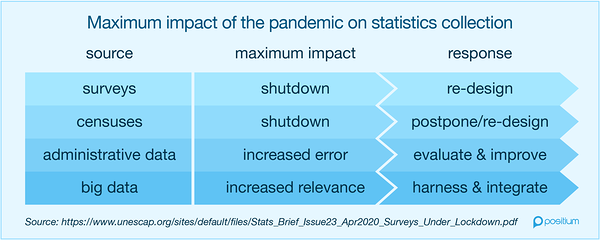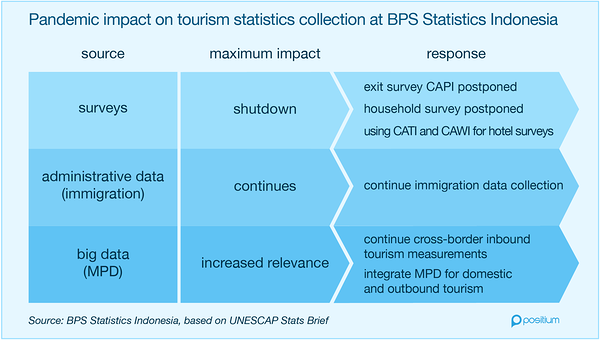A time of crisis, such as the COVID-19 pandemic, requires agile policy response. Responding rapidly without timely data and statistics is like “solving a Rubik’s cube blindfolded”. What is more, policies need to be reassessed on the spot, and for that policy impact analysis with a continued time series of data is crucial. Authorities can benefit greatly from understanding how people’s mobility has changed after lockdown has been placed.
Surveys are a common data collection method in nationwide statistical operations, such as censuses, businesses and household surveys, yet their direct, face-to-face nature makes them impossible to use during a pandemic. Even if re-designed and distributed online, surveys might not be able to provide timely results during a crisis. Although immigration data has flatlined at the end of March and total movement across the borders has plummeted, data is more important than ever to assess the effects.
Statistics at the time of COVID-19 in Indonesia
We spoke with Titi Kanti Lestari, Director of Finance, IT and Tourism Statistics at BPS Statistics Indonesia, about how they are coping with the changes the pandemic has brought. “We have not been able to conduct face-to-face surveys since mid-March. Even before official regulations were set in place, some households already refused enumerators due to fear of contracting COVID-19,” she said.
However, as the saying goes, “the show must go on” – on the first working day of the month, results are expected from BPS Statistics Indonesia in the form of a press release. “Having continuous statistics production is the commitment we have made to the public,” she explains. The government needs timely data from BPS Statistics Indonesia to make decisions on how to overcome the impact of COVID-19 in different sectors.
Since 2016, Indonesia has been using big data (i.e. mobile phone data) for the monthly production of inbound tourism statistics (formerly it was based on cross border surveys), and, from 2020, they will be using mobile positioning data (MPD) integrated with digital surveying for domestic and outbound tourism, instead of household surveys. They reported the high value of this data source since it has not been affected by the pandemic. Lestari added: “I think with MPD, authorities could respond to COVID-19 faster with timely, more frequent and more granular data.”
Although complicated, the current situation can open up new prospects in statistics and allows national statistics offices to be innovative. National statistical production has the unique opportunity to think outside of the box and transform statistical operations moving forward in an innovative way by using big data. Big data provides valuable input to COVID-19 response with minimal to no risk. During a pandemic, big data, such as that from mobile network operators, has increased in relevance and can provide a contactless, fast and timely data source.
Would you be interested in learning more about mobile big data and Positium? Let's talk about what mobile big data can do to help your organisation make decisions based on population mobility.
.png)

